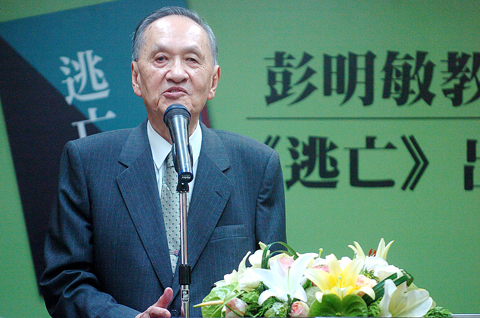On Sept. 20, 1964, Peng Ming-min (彭明敏) was arrested for treason for advocating democracy in Taiwan. He was sentenced to eight years in prison in 1965 and put under house arrest later the same year after receiving a special pardon.
On Jan. 2, 1970, Peng left his family and began a 22-year exile.
At a book launch in Taipei yesterday, the 86-year-old shared his successful escape from the then-Chinese Nationalist Party (KMT) regime 39 years ago, which he describes in his book titled A Perfect Escape.

PHOTO: GEORGE TSORNG, TAIPEI TIMES
“I often ask myself: If I had made a different decision, what would have become of me?” Peng, former senior presidential adviser under the Democratic Progressive Party administration, told an audience yesterday.
After Japan’s defeat in World War II, Peng, who at the time was studying political science at the University of Tokyo, had to decide whether to stay in Japan or return to Taiwan.
If he had stayed in Japan, he would have had to change his Chinese name and would probably have ended up teaching, practicing law, writing or working in the public sector, Peng said.
“But I loved this country [Taiwan] so much that I wanted to go home … It did not take me long to decide,” he said.
Filled with patriotism and ideals, Peng was in for a major disappointment after he saw how the KMT was governing Taiwan.
Peng returned to Taiwan in 1946 and studied political science at National Taiwan University. In 1951, he obtained a scholarship to study at McGill University in Montreal. He was offered a job there, but turned it down. He studied law at the University of Paris and obtained a doctor of laws degree in 1954.
Peng said the KMT government tried to recruit him after his return from Paris. But after witnessing the 228 Incident, the imposition of Martial Law and the White Terror, he had to decide between serving under the KMT and securing wealth and status, or following his conscience and fighting for freedom and democracy.
In 1964, Peng was arrested along with two of his students, Hsieh Tsung-min (謝聰敏) and Wei Ting-chao (魏廷朝), for publishing the Declaration of Formosan Self-Salvation.
For his own safety and that of his family, Peng said he decided to flee the country. With help from various individuals — Peng said he had to be careful with details in the book to protect the privacy of individuals and respect the wish of those who helped him but wanted to remain anonymous — his escape took him through Hong Kong, Bangkok, the Soviet Union and Denmark before he arrived in Stockholm, where he was granted political asylum.
Peng later moved to the US with held from his friends and joined the campaign for Taiwan independence.
Peng yesterday lamented the dramatic change in Taiwan’s political climate since President Ma Ying-jeou (馬英九) was elected last year, saying the country seemed to be gradually returning to the old days when the KMT was in power.
“Can we accept that the eight years of freedom and democracy we enjoyed were just a short episode? Is it normal to have a foreign regime govern this land? We must carefully think about that,” he said.

Taiwan has received more than US$70 million in royalties as of the end of last year from developing the F-16V jet as countries worldwide purchase or upgrade to this popular model, government and military officials said on Saturday. Taiwan funded the development of the F-16V jet and ended up the sole investor as other countries withdrew from the program. Now the F-16V is increasingly popular and countries must pay Taiwan a percentage in royalties when they purchase new F-16V aircraft or upgrade older F-16 models. The next five years are expected to be the peak for these royalties, with Taiwan potentially earning

STAY IN YOUR LANE: As the US and Israel attack Iran, the ministry has warned China not to overstep by including Taiwanese citizens in its evacuation orders The Ministry of Foreign Affairs (MOFA) yesterday rebuked a statement by China’s embassy in Israel that it would evacuate Taiwanese holders of Chinese travel documents from Israel amid the latter’s escalating conflict with Iran. Tensions have risen across the Middle East in the wake of US and Israeli airstrikes on Iran beginning Saturday. China subsequently issued an evacuation notice for its citizens. In a news release, the Chinese embassy in Israel said holders of “Taiwan compatriot permits (台胞證)” issued to Taiwanese nationals by Chinese authorities for travel to China — could register for evacuation to Egypt. In Taipei, the ministry yesterday said Taiwan

Taiwan is awaiting official notification from the US regarding the status of the Agreement on Reciprocal Trade (ART) after the US Supreme Court ruled US President Donald Trump's global tariffs unconstitutional. Speaking to reporters before a legislative hearing today, Premier Cho Jung-tai (卓榮泰) said that Taiwan's negotiation team remains focused on ensuring that the bilateral trade deal remains intact despite the legal challenge to Trump's tariff policy. "The US has pledged to notify its trade partners once the subsequent administrative and legal processes are finalized, and that certainly includes Taiwan," Cho said when asked about opposition parties’ doubts that the ART was

If China chose to invade Taiwan tomorrow, it would only have to sever three undersea fiber-optic cable clusters to cause a data blackout, Jason Hsu (許毓仁), a senior fellow at the Hudson Institute and former Chinese Nationalist Party (KMT) legislator, told a US security panel yesterday. In a Taiwan contingency, cable disruption would be one of the earliest preinvasion actions and the signal that escalation had begun, he said, adding that Taiwan’s current cable repair capabilities are insufficient. The US-China Economic and Security Review Commission (USCC) yesterday held a hearing on US-China Competition Under the Sea, with Hsu speaking on